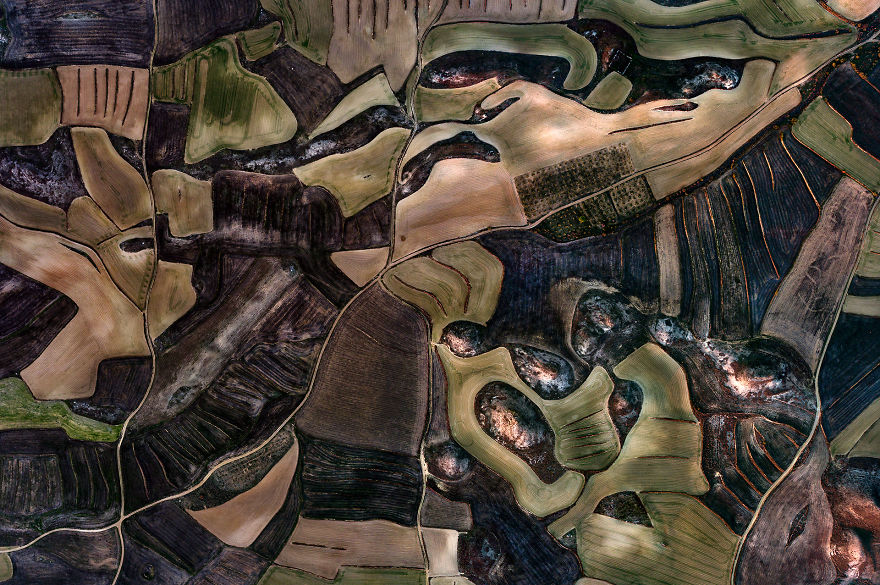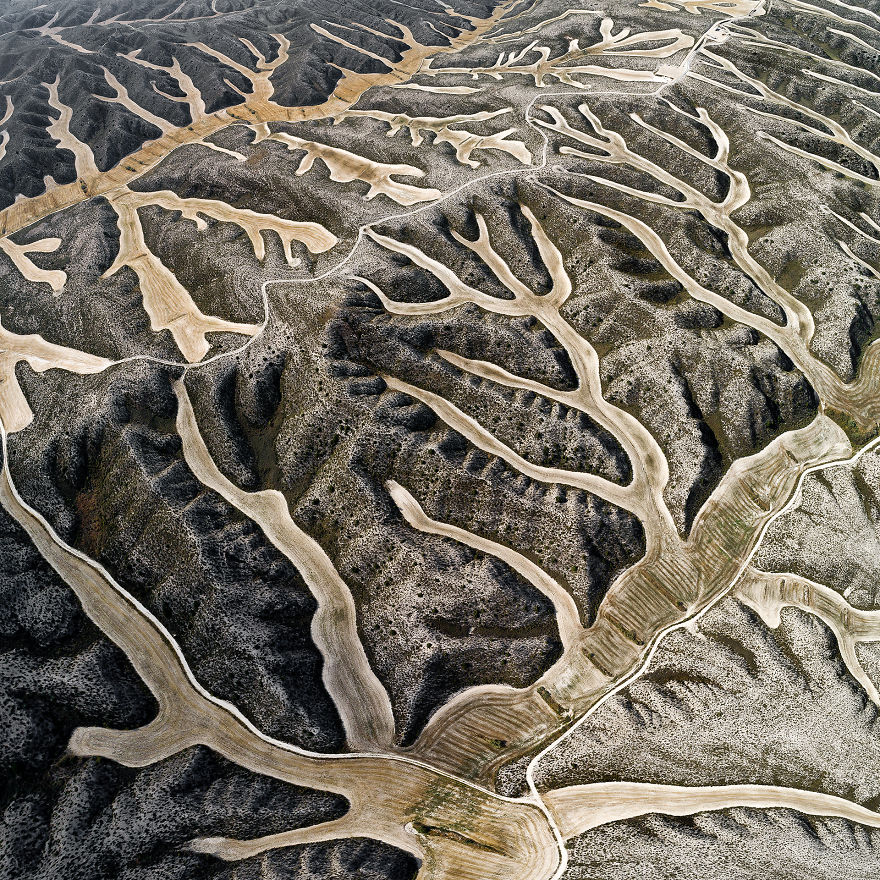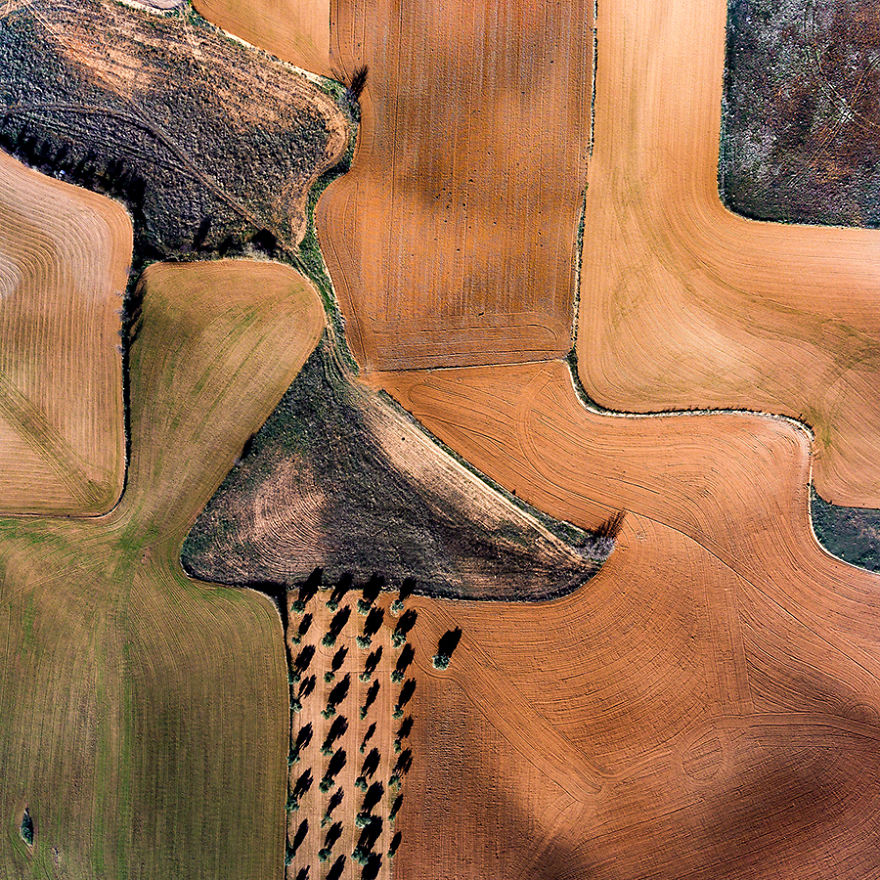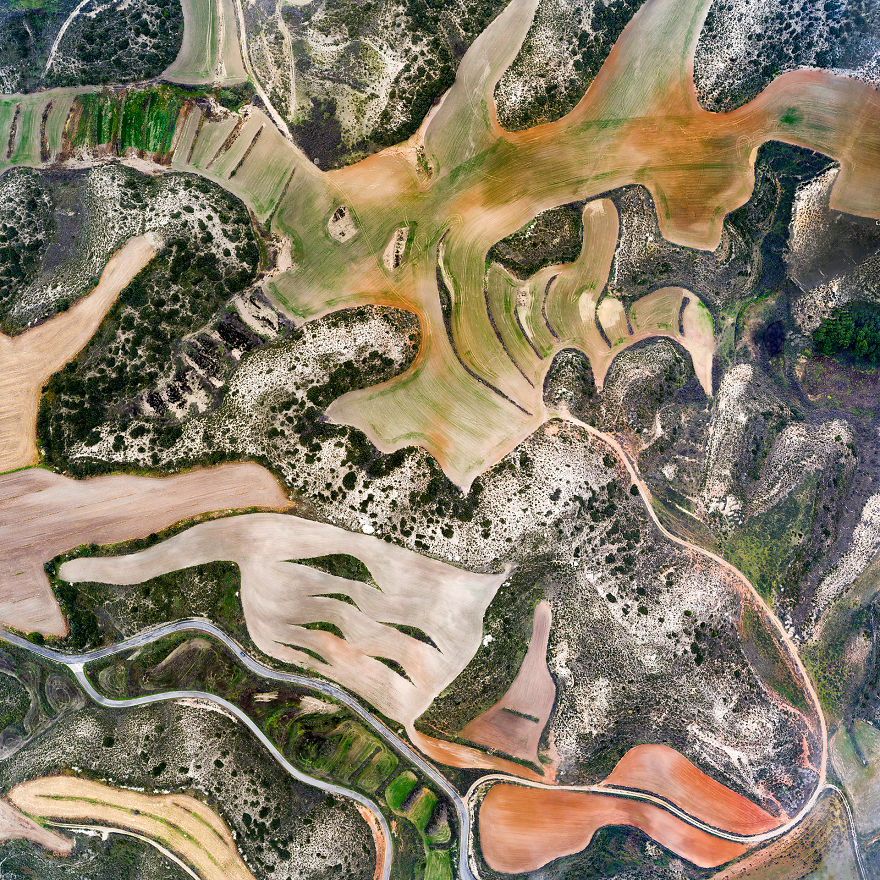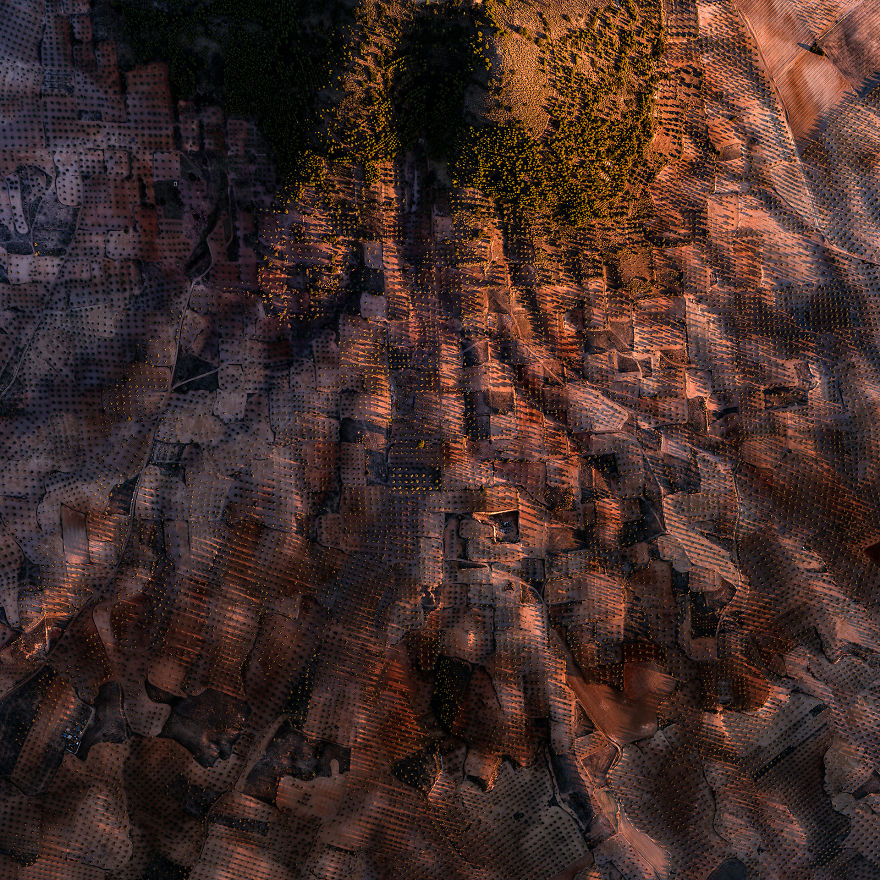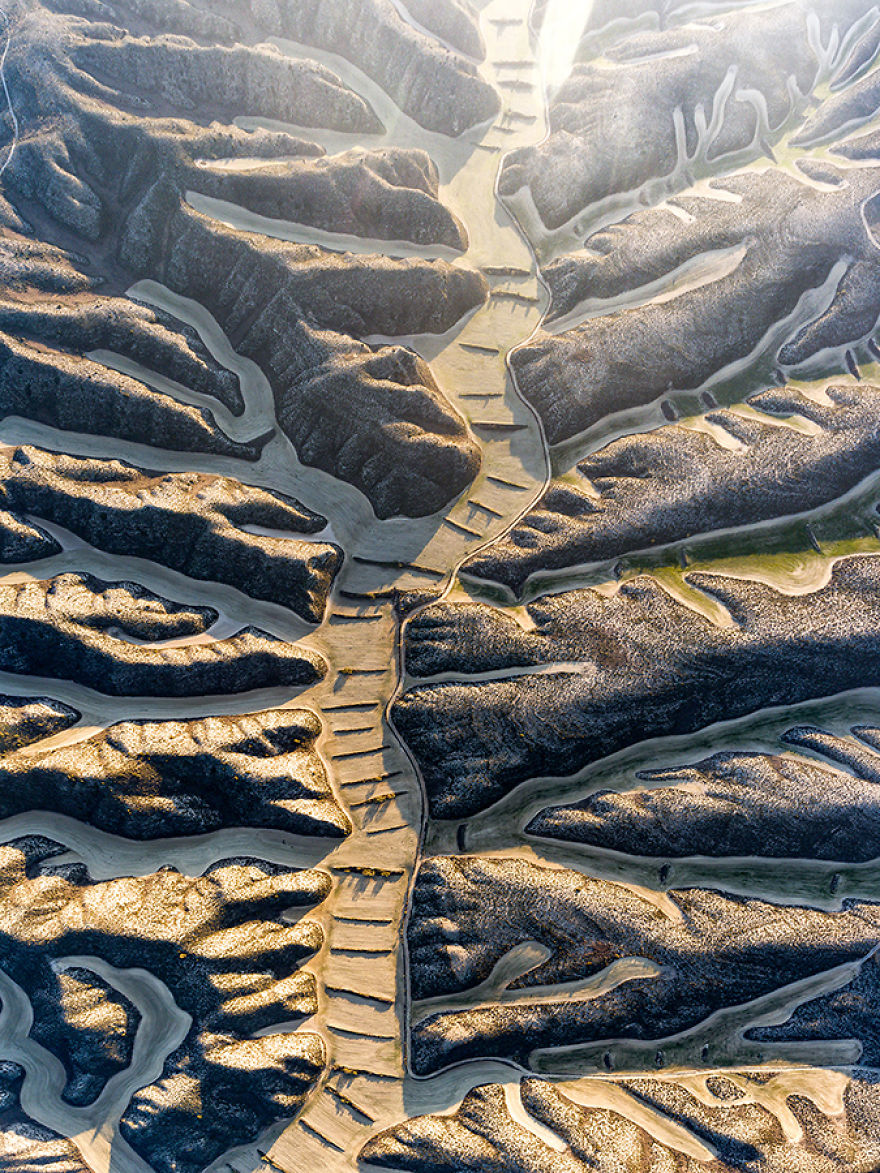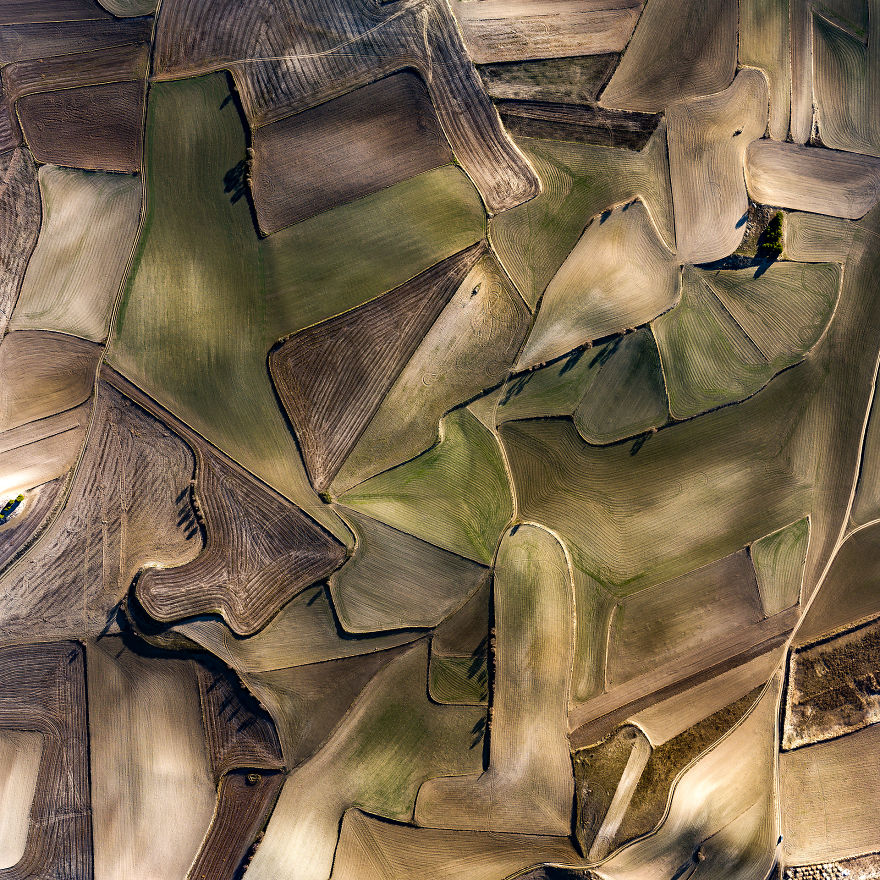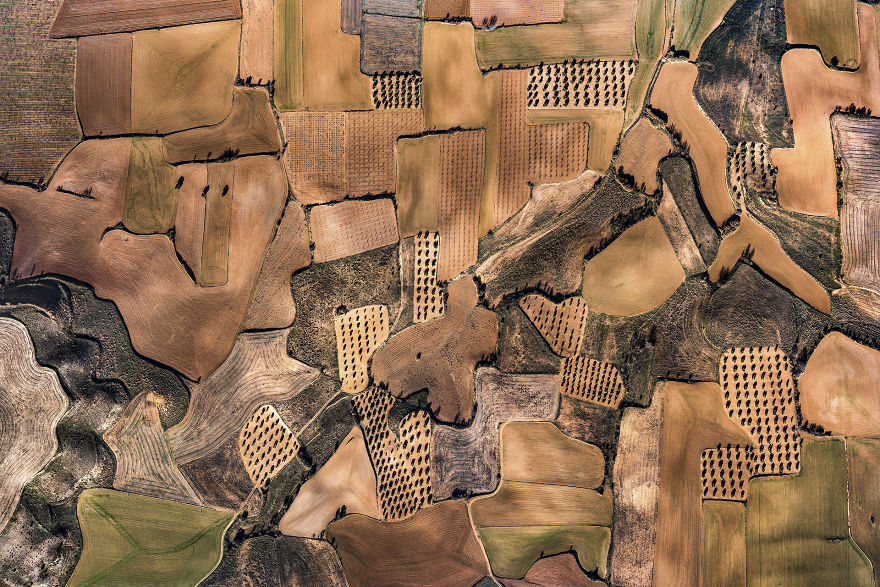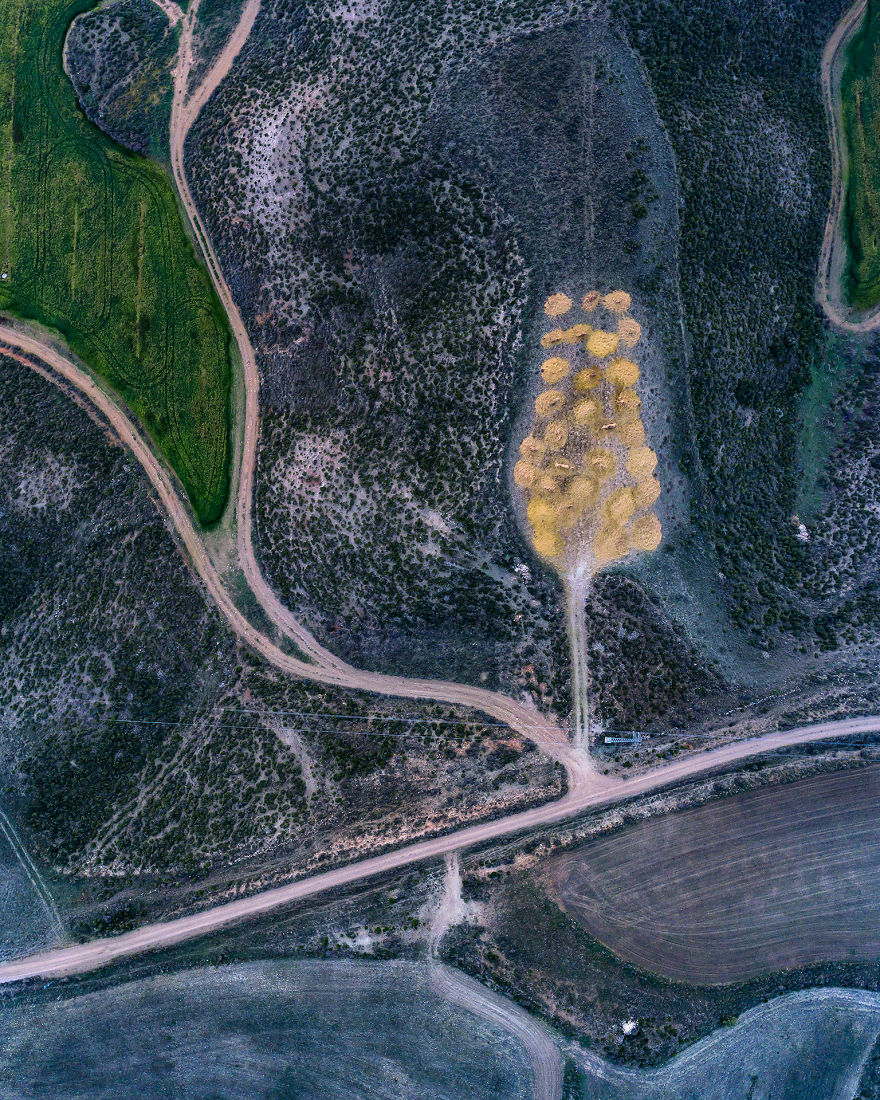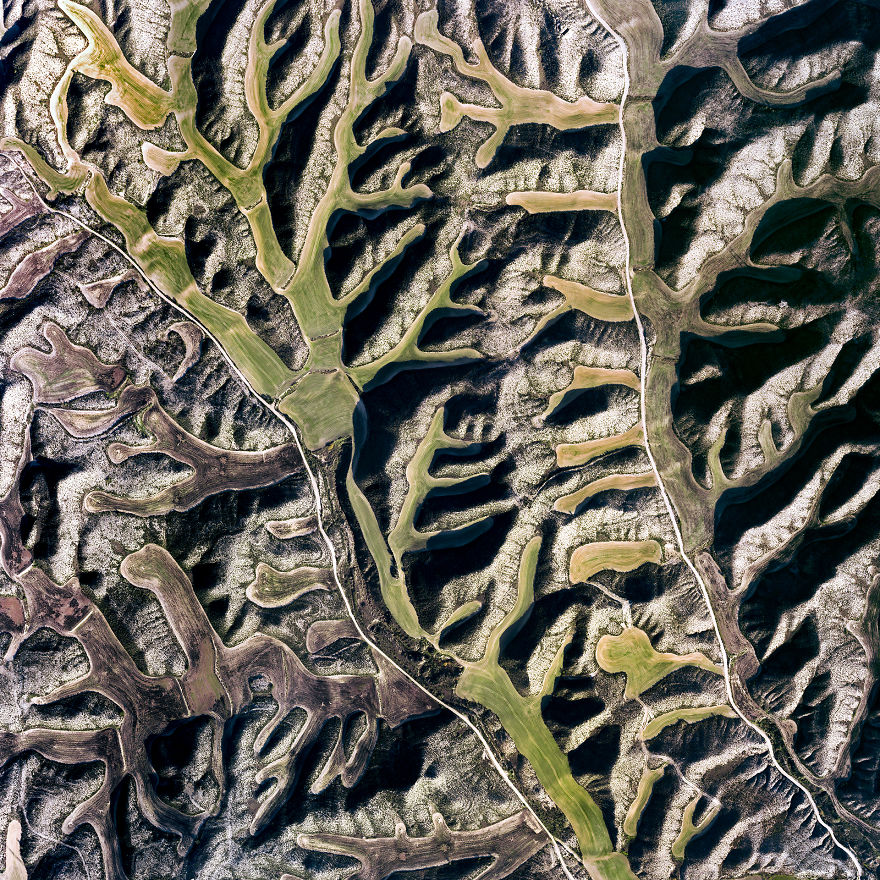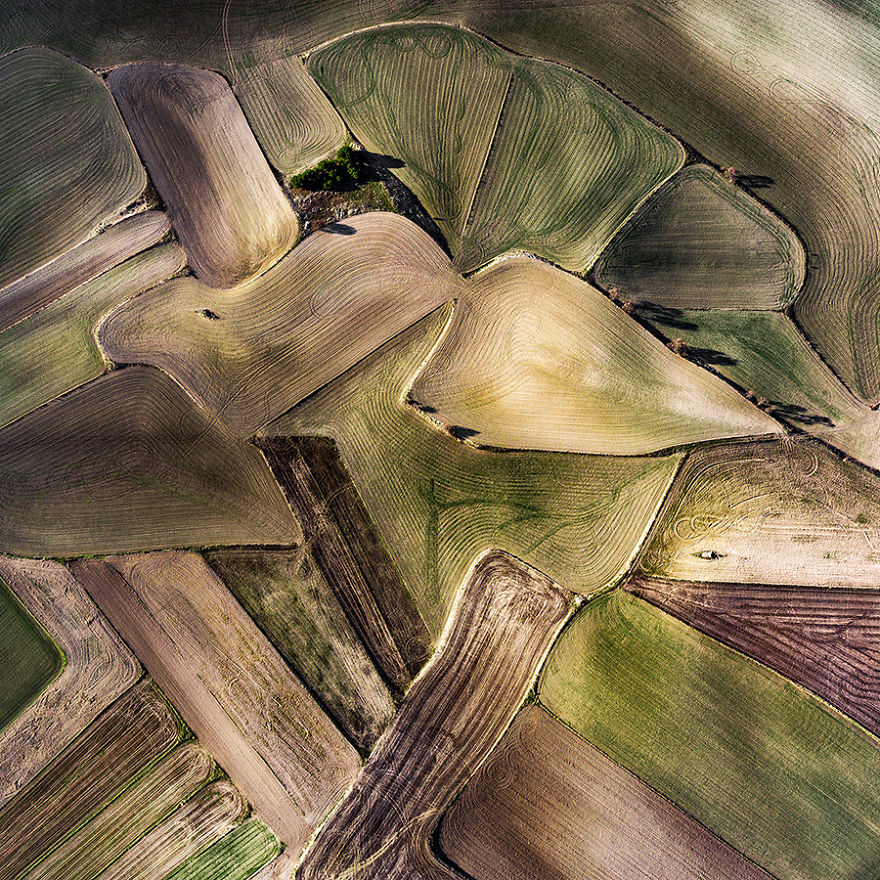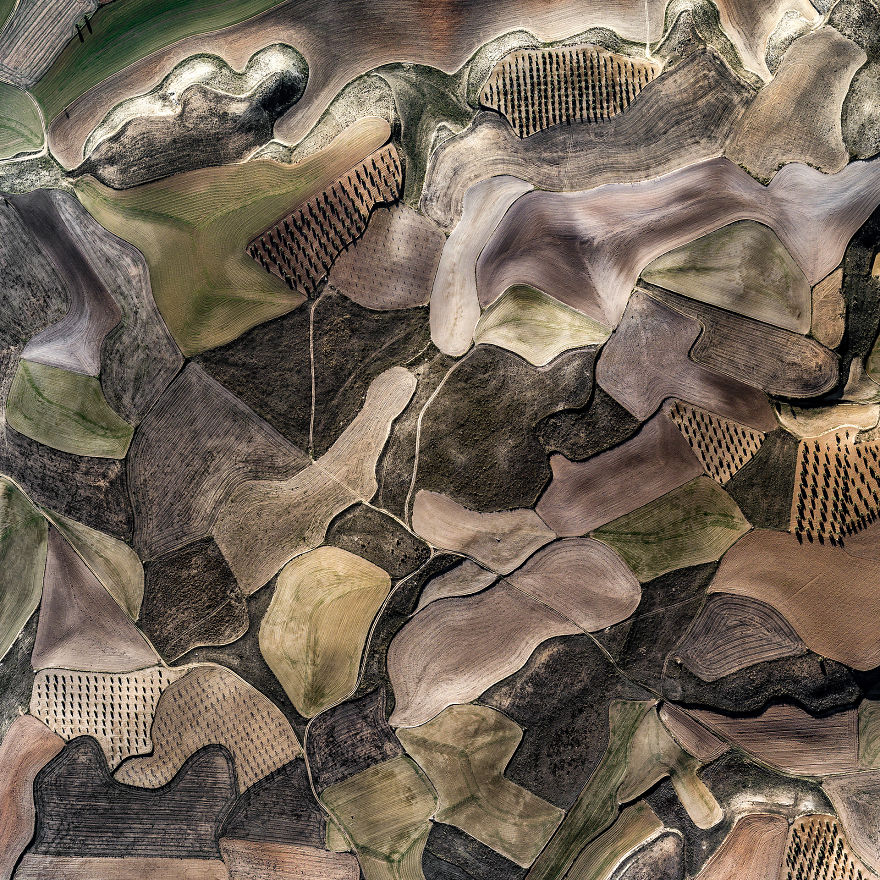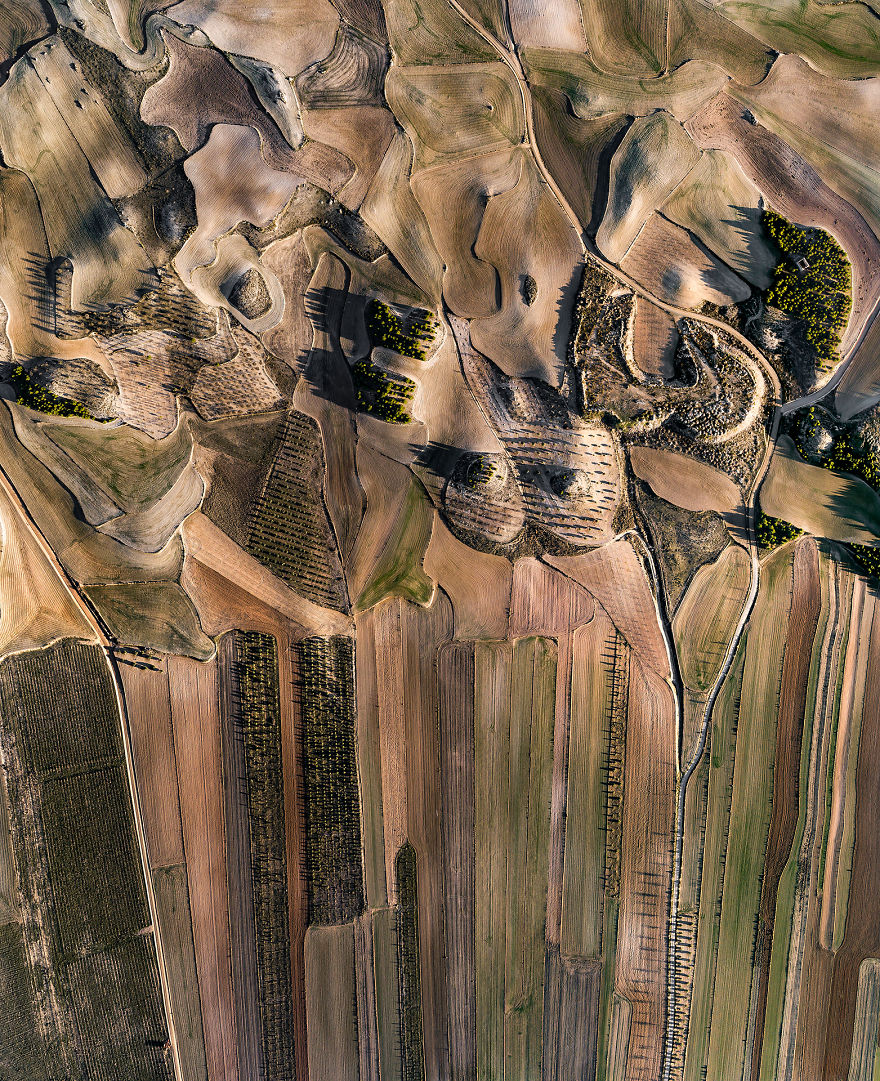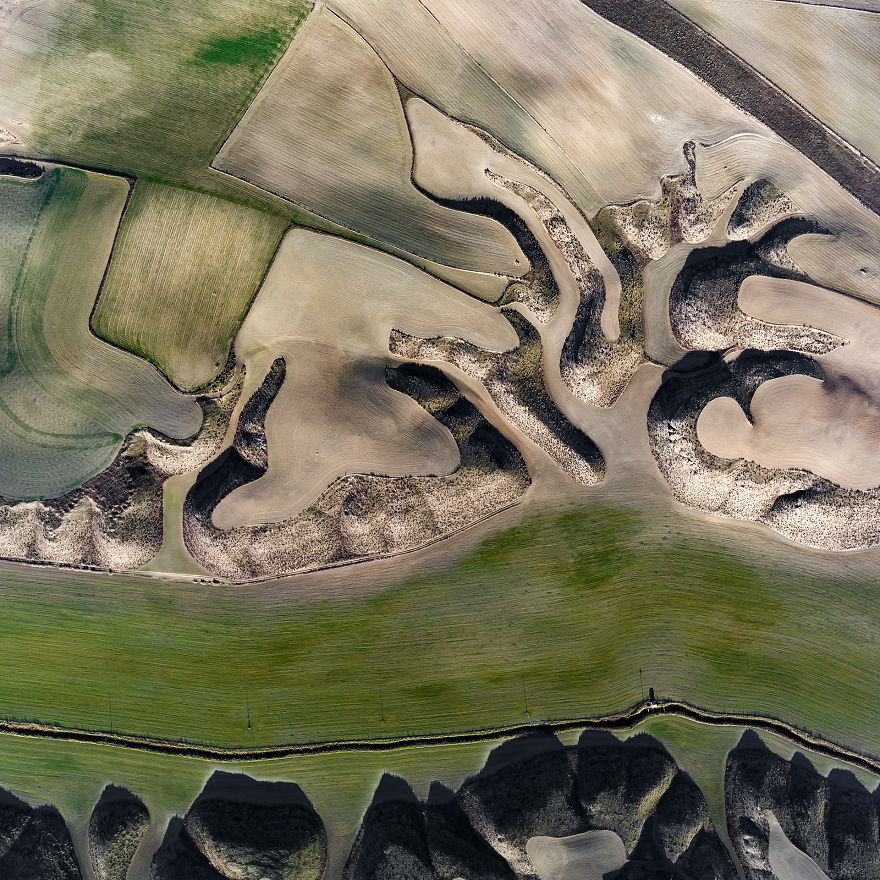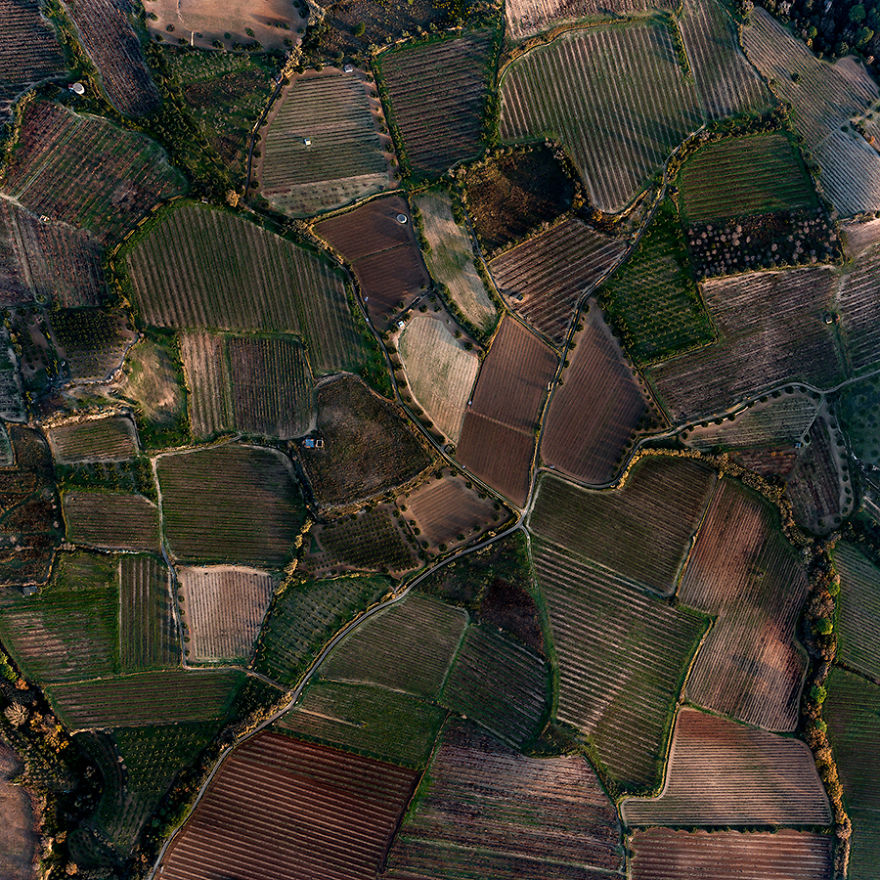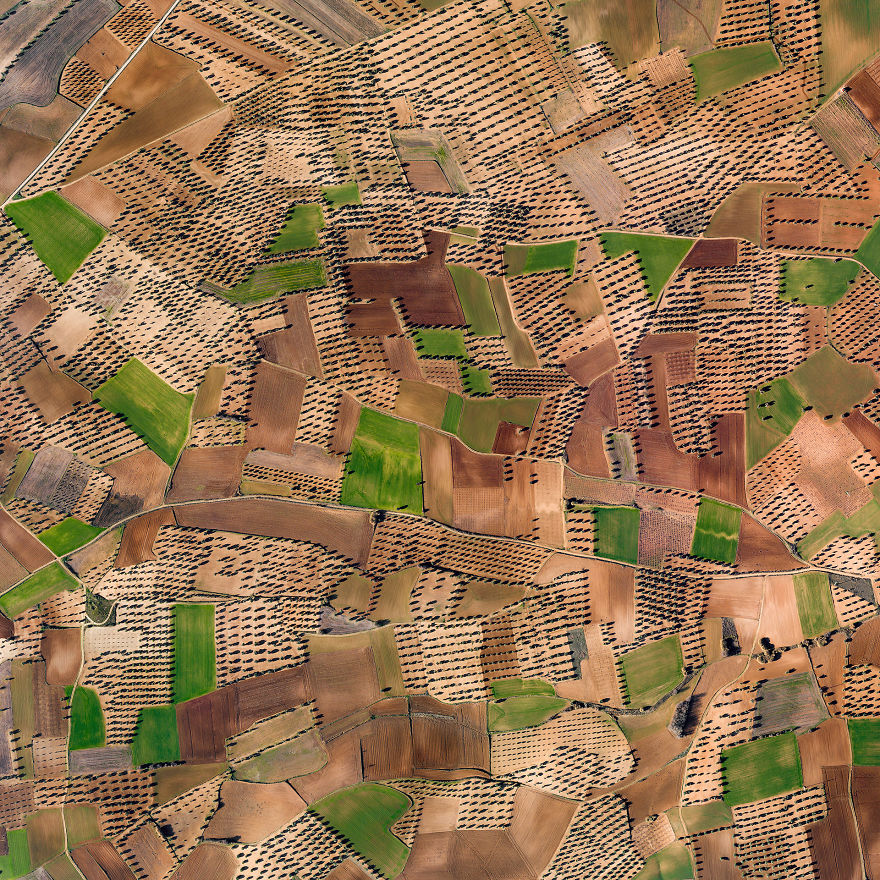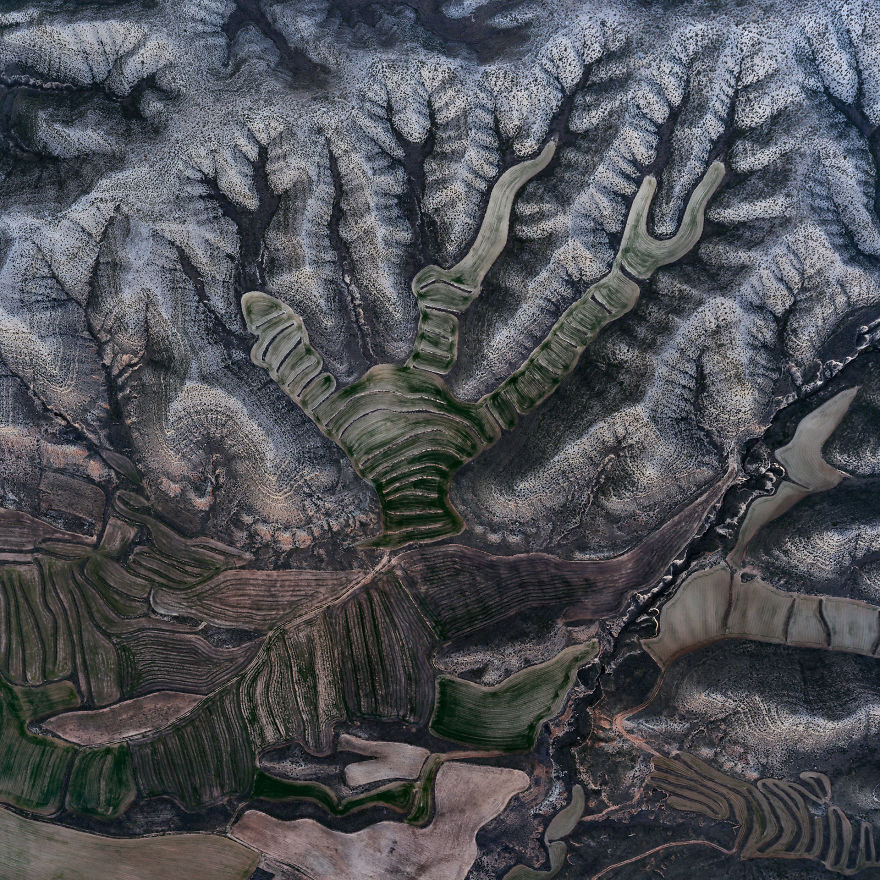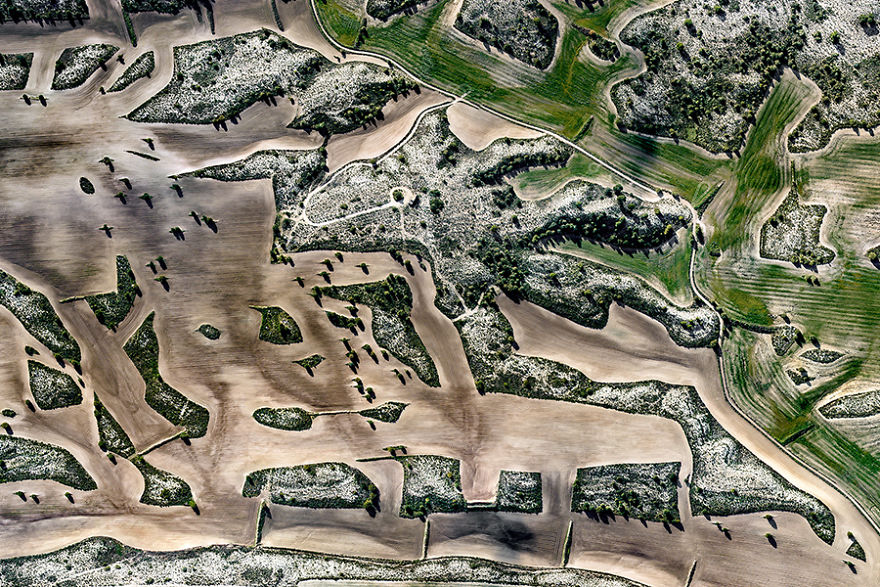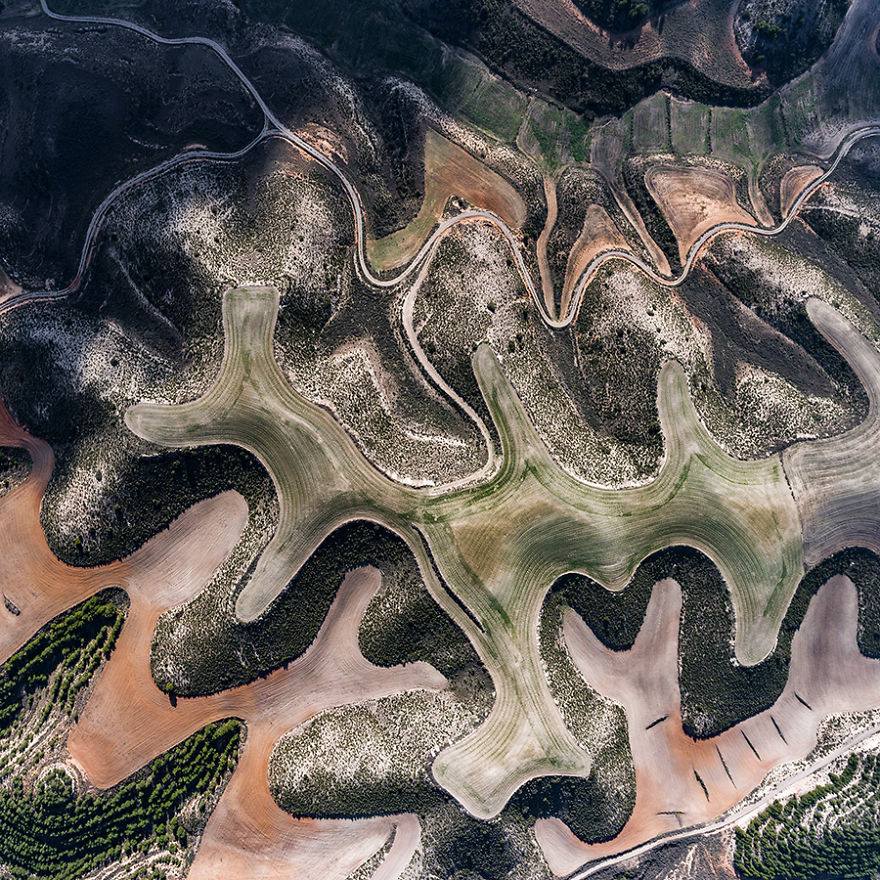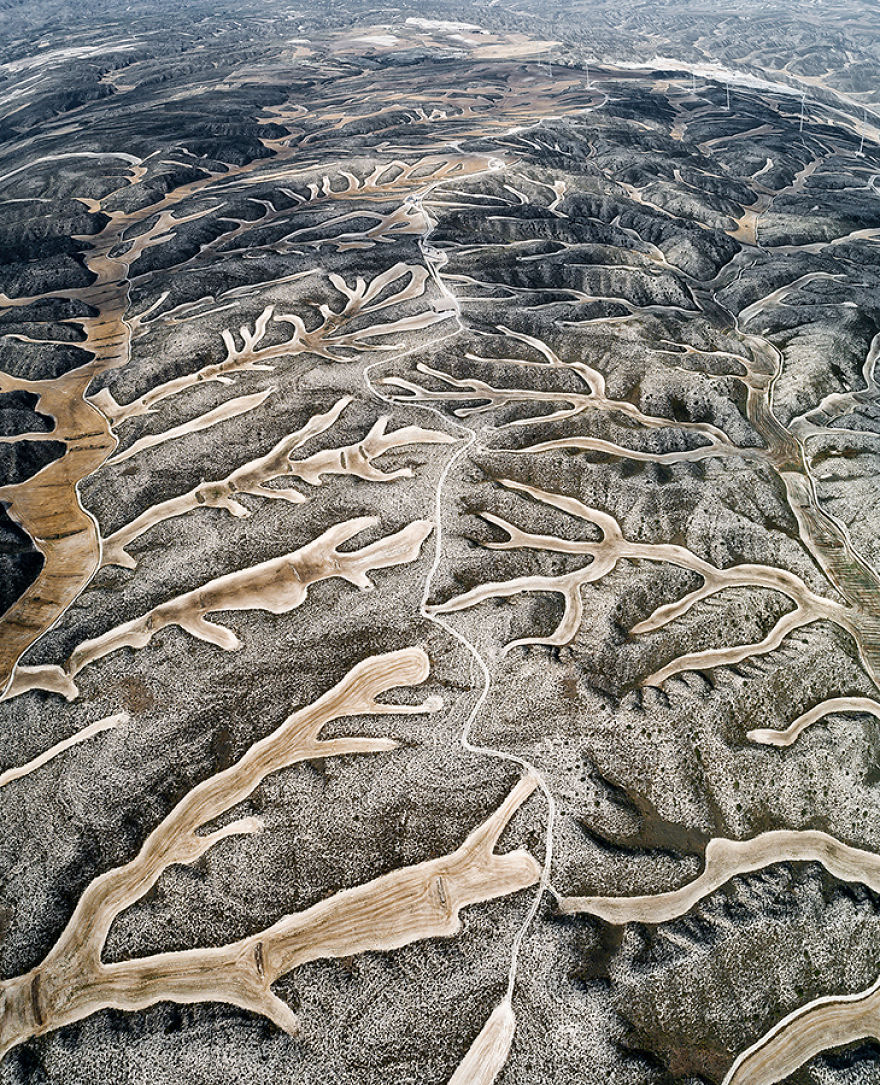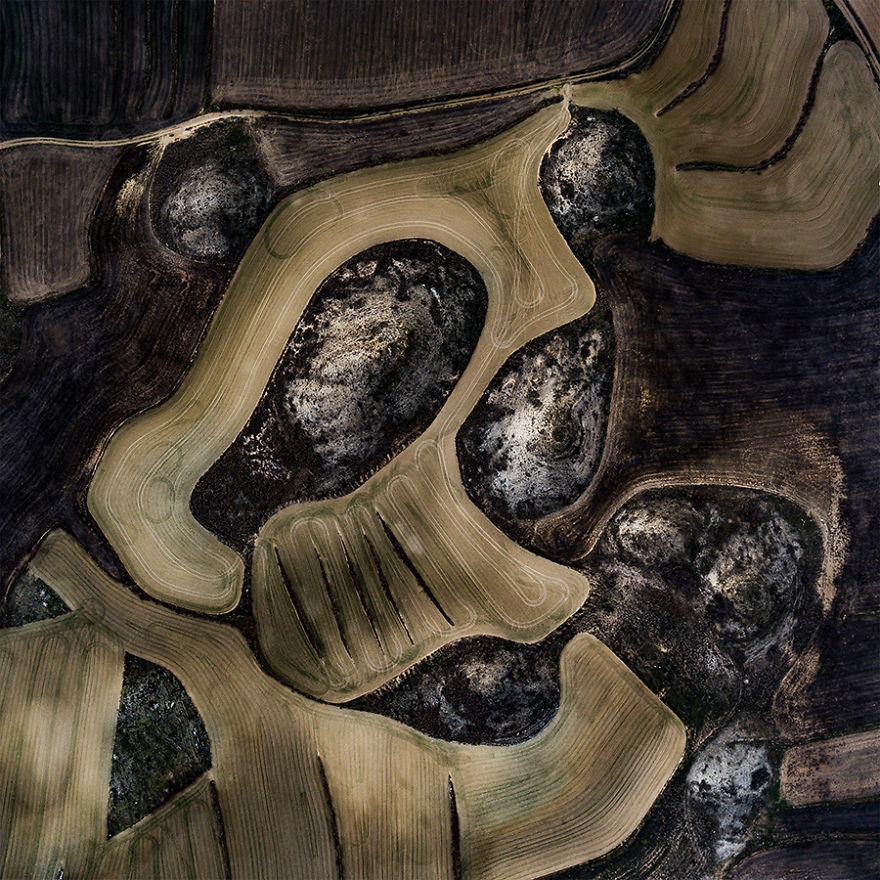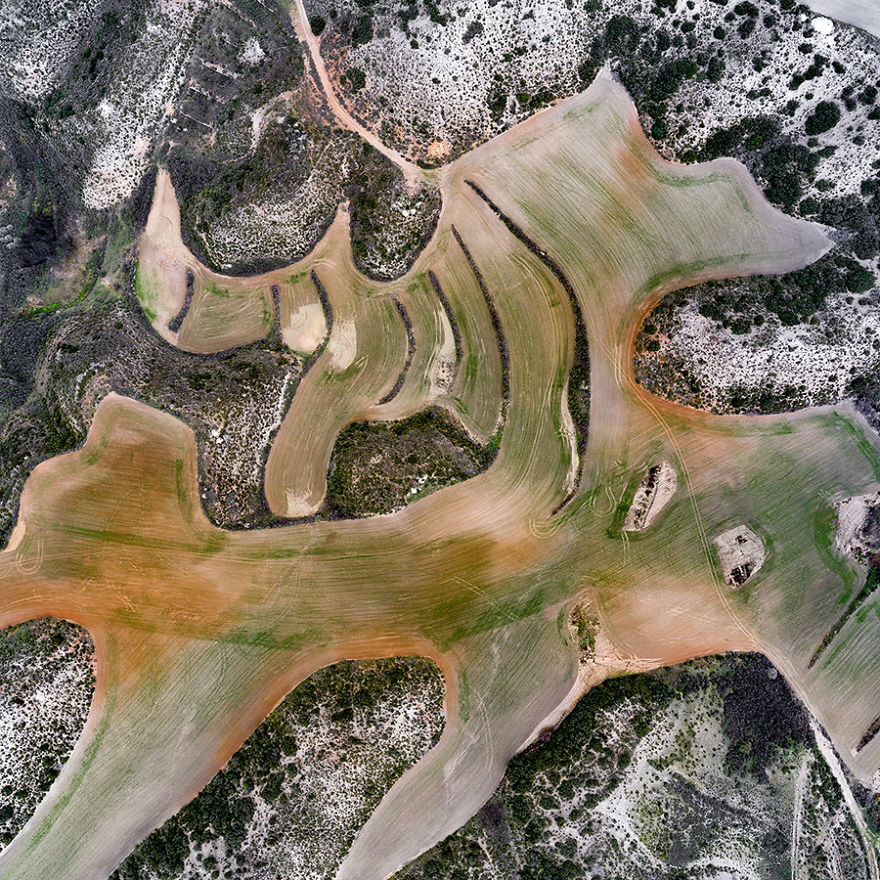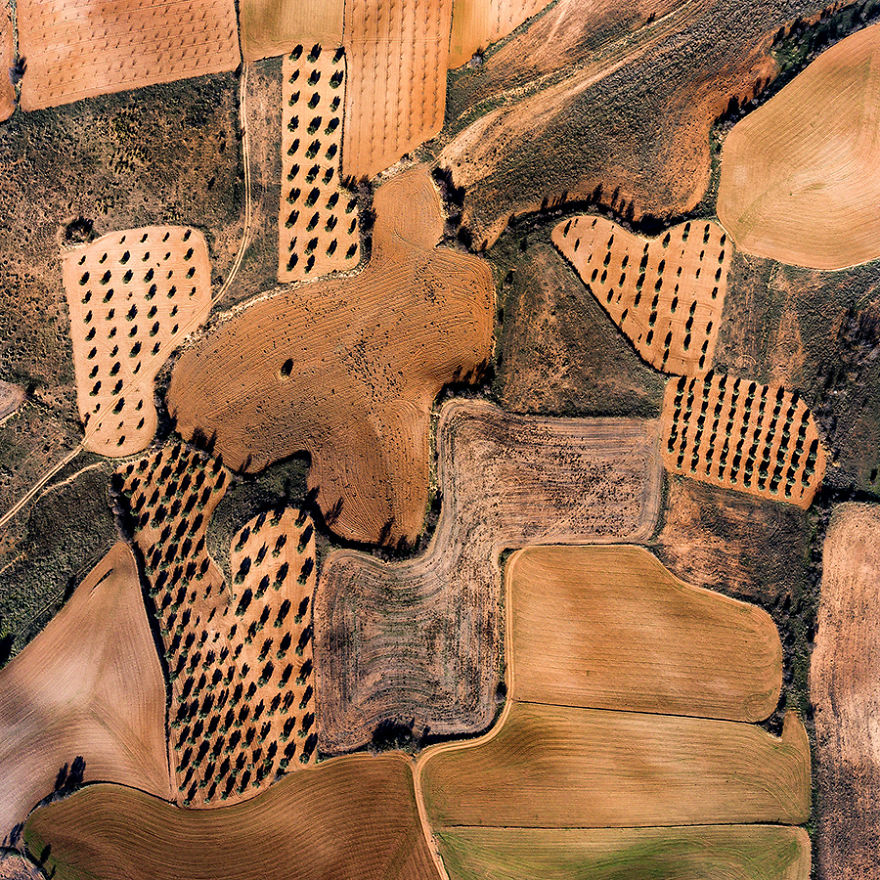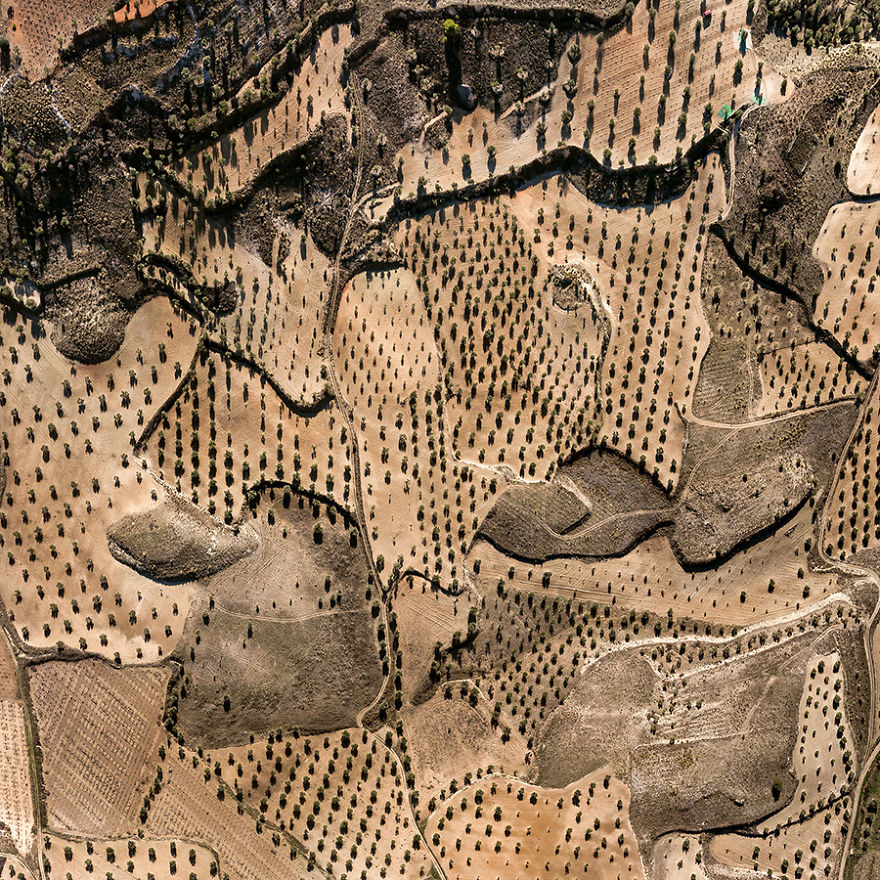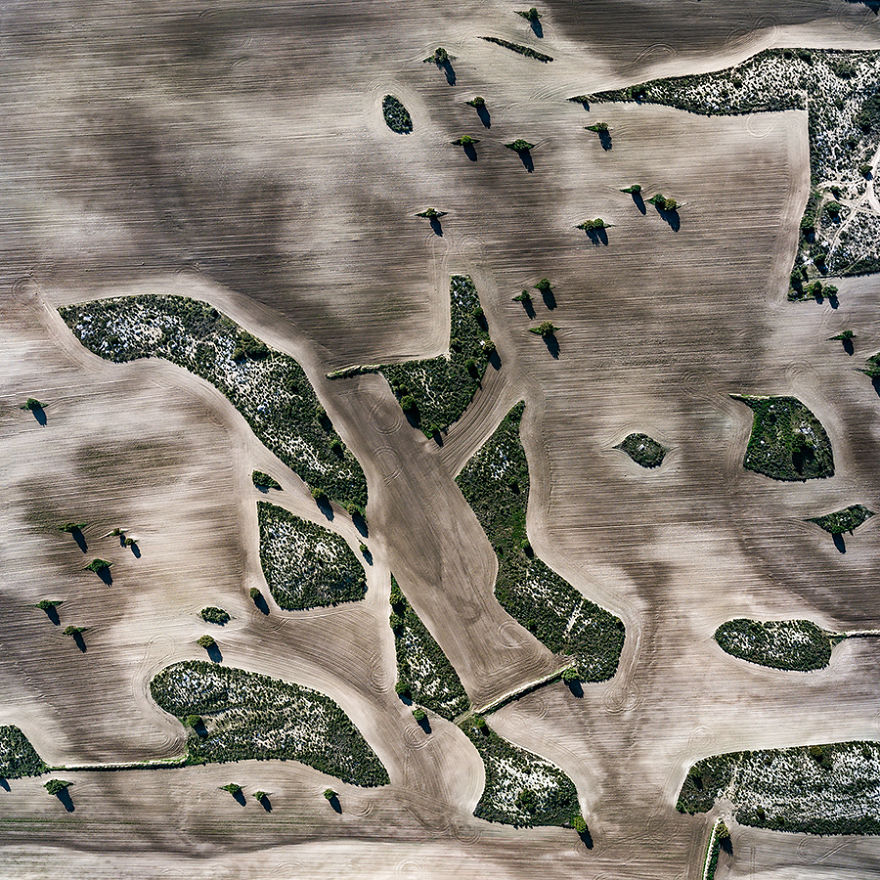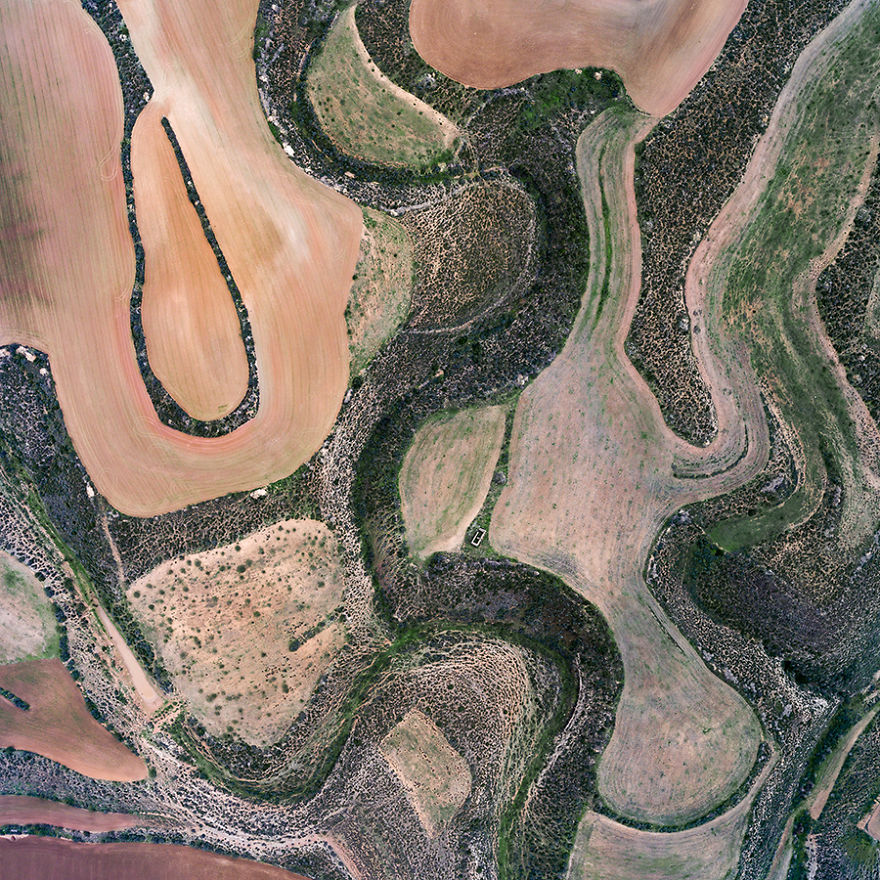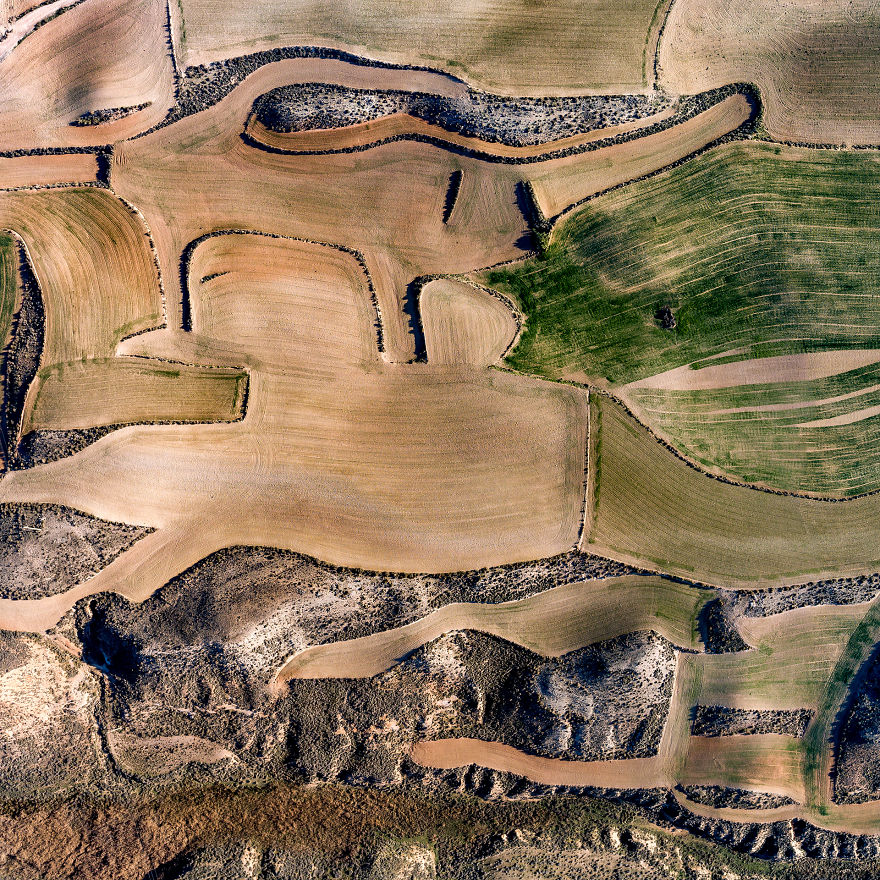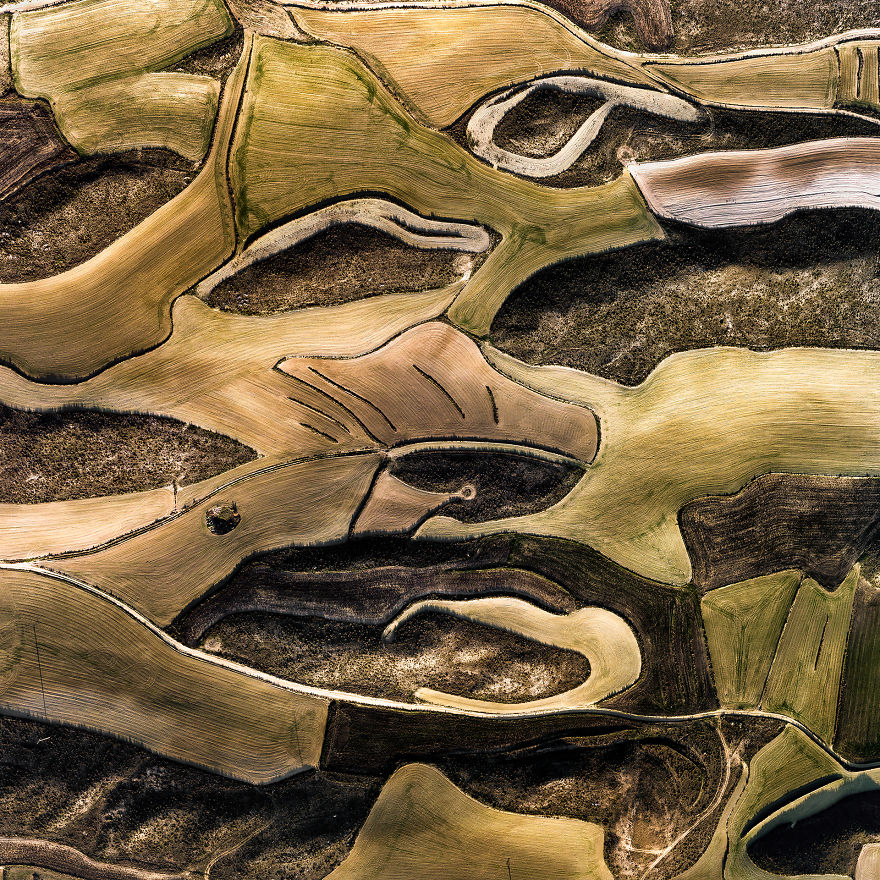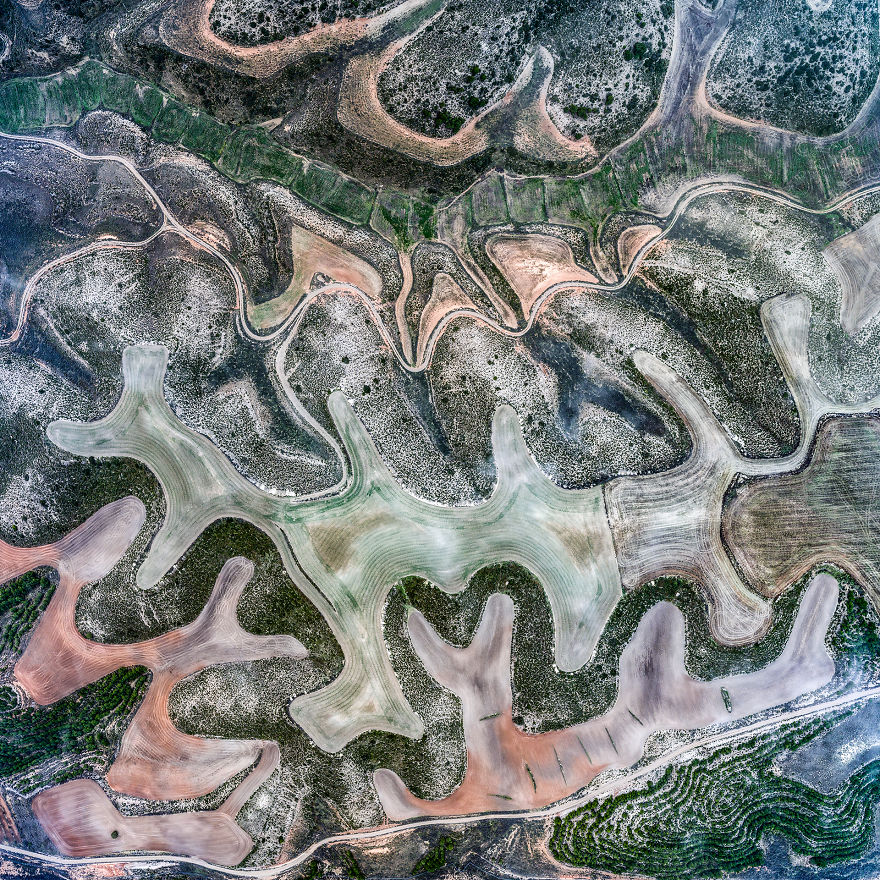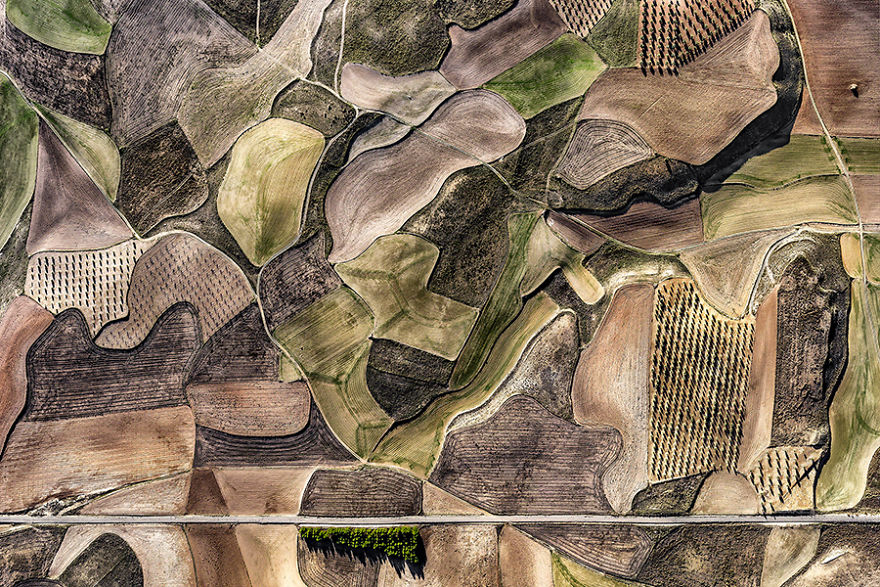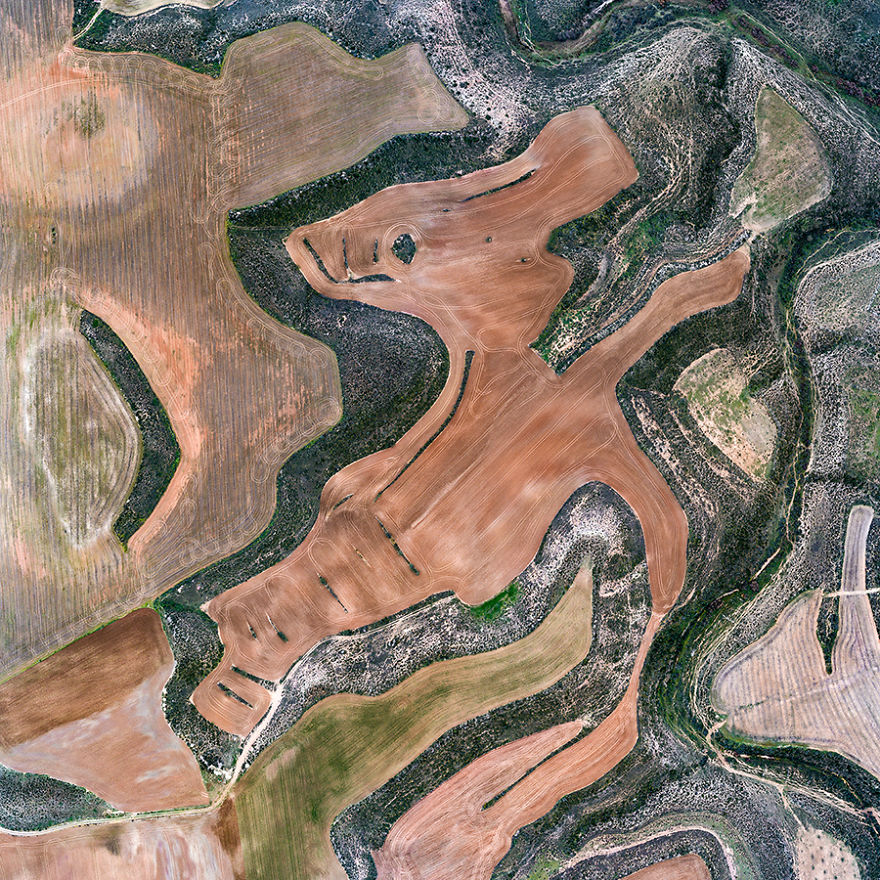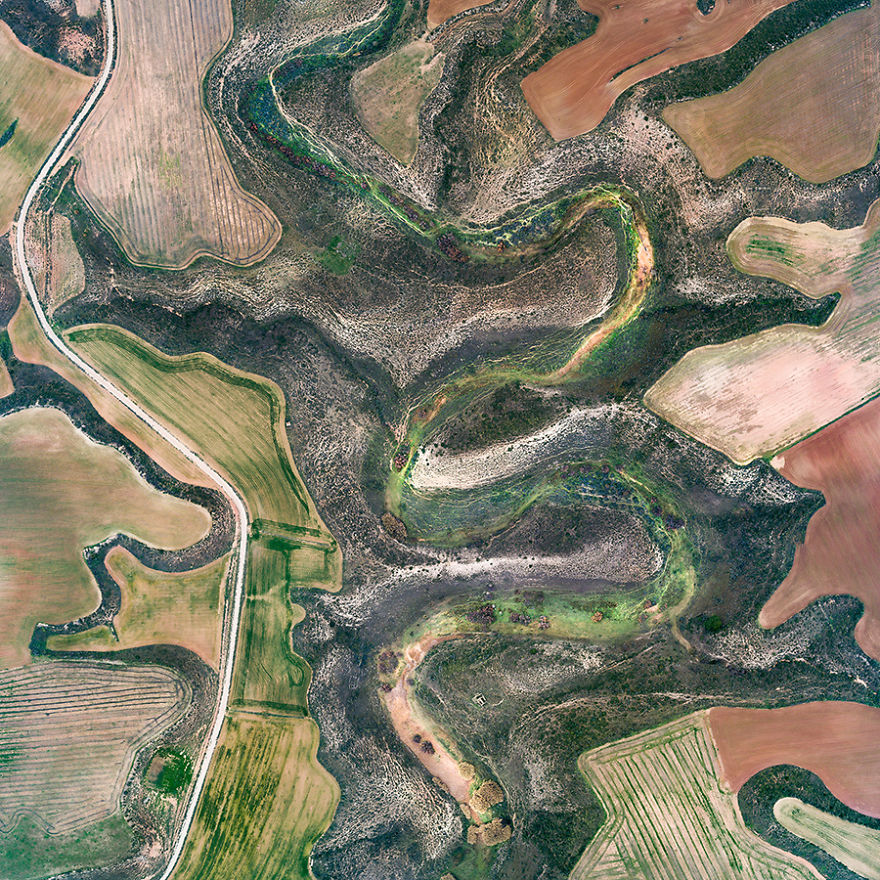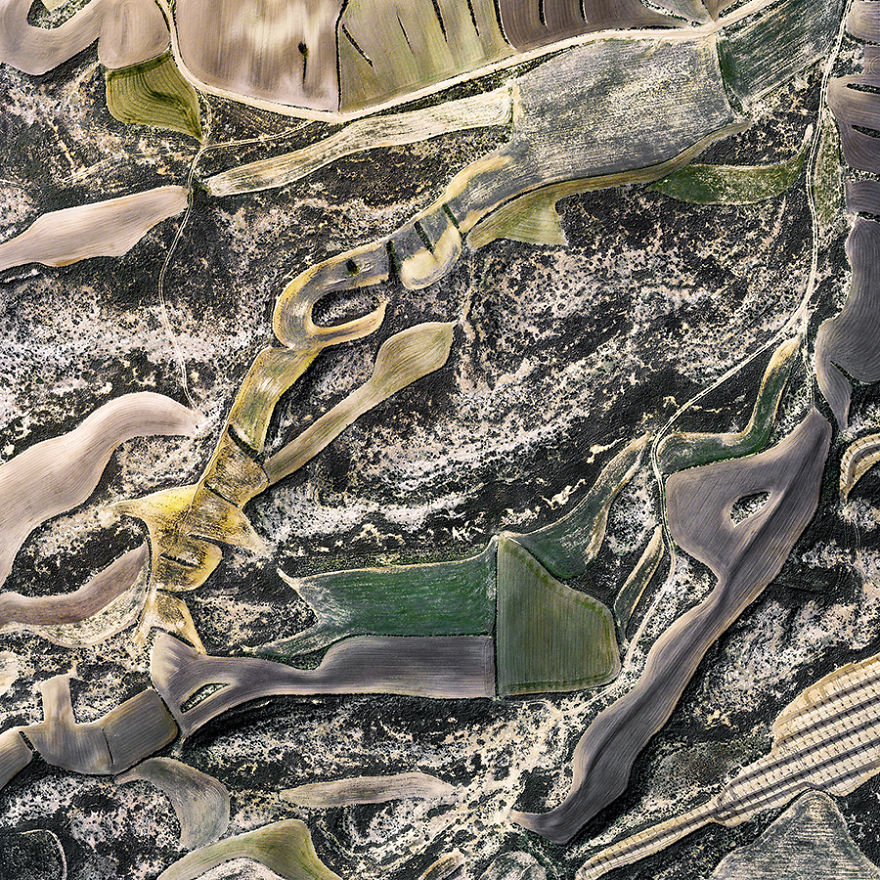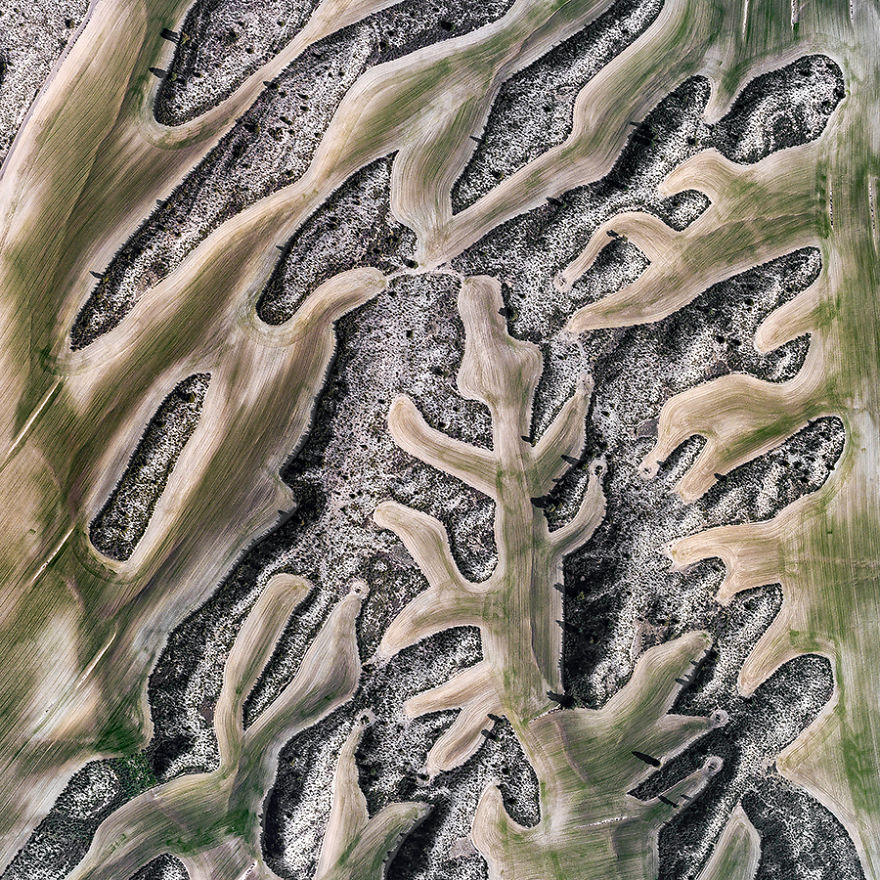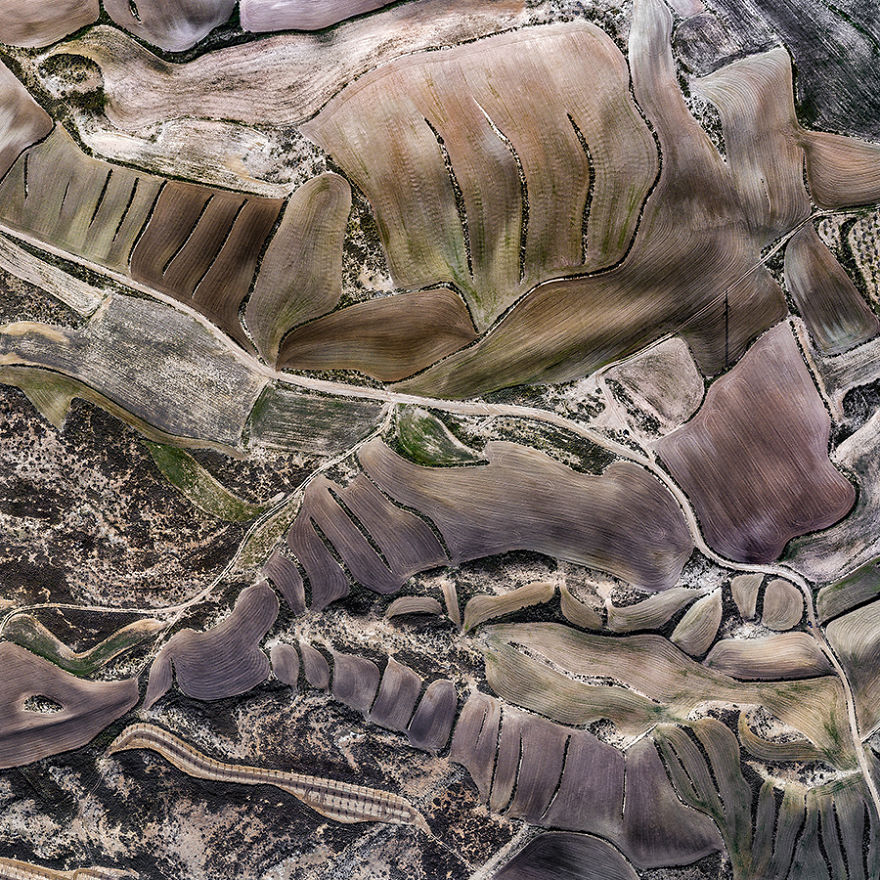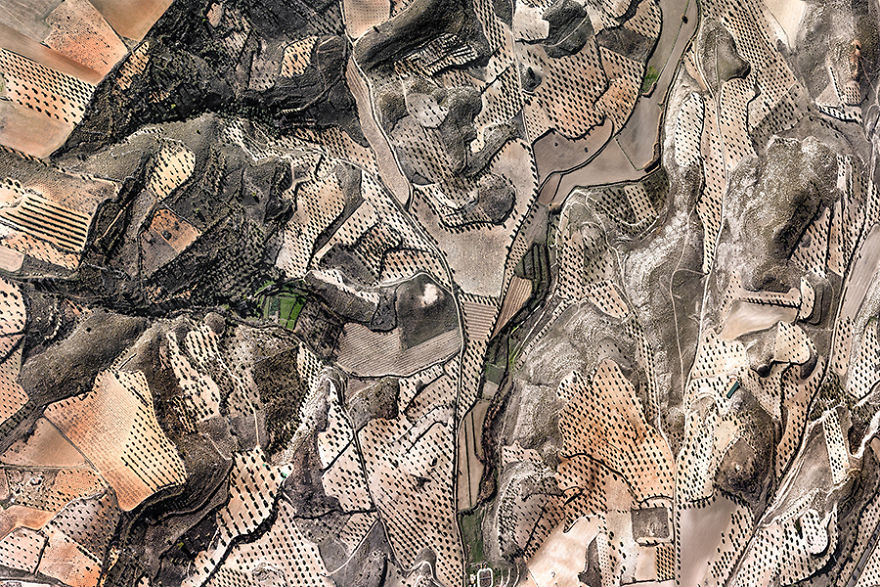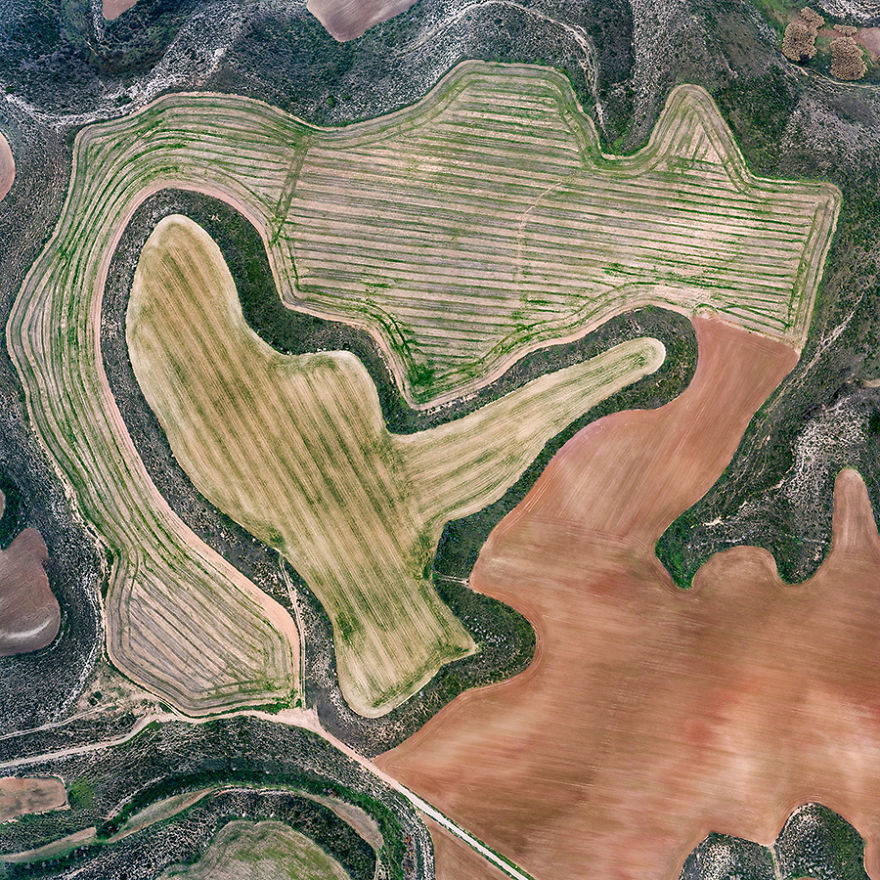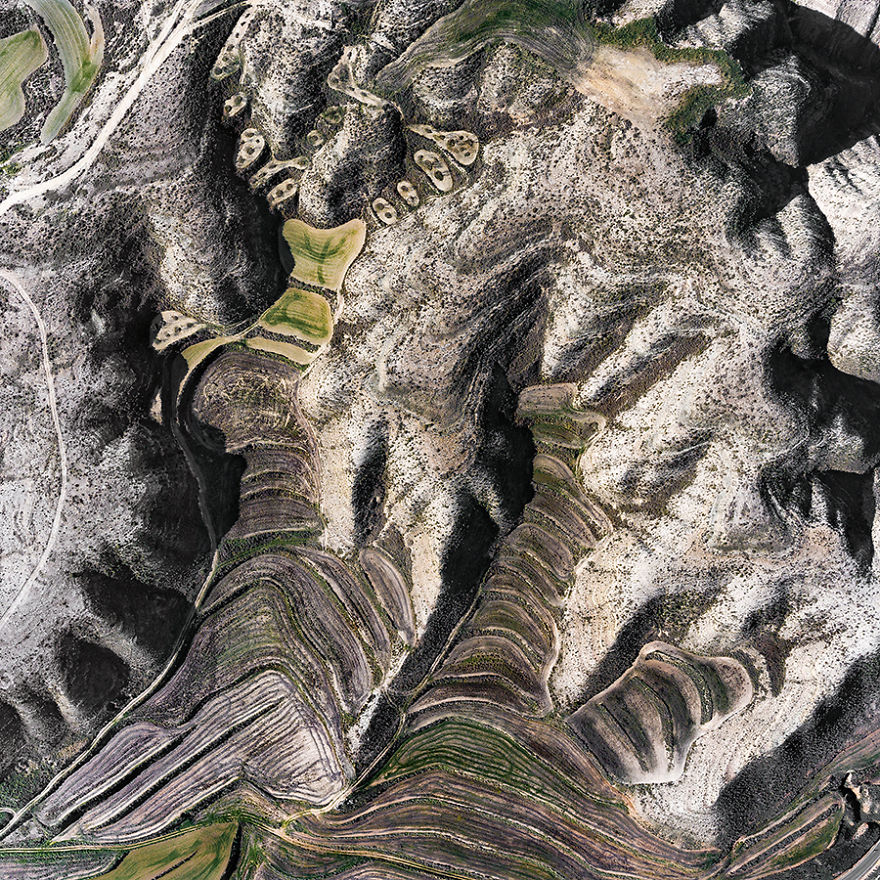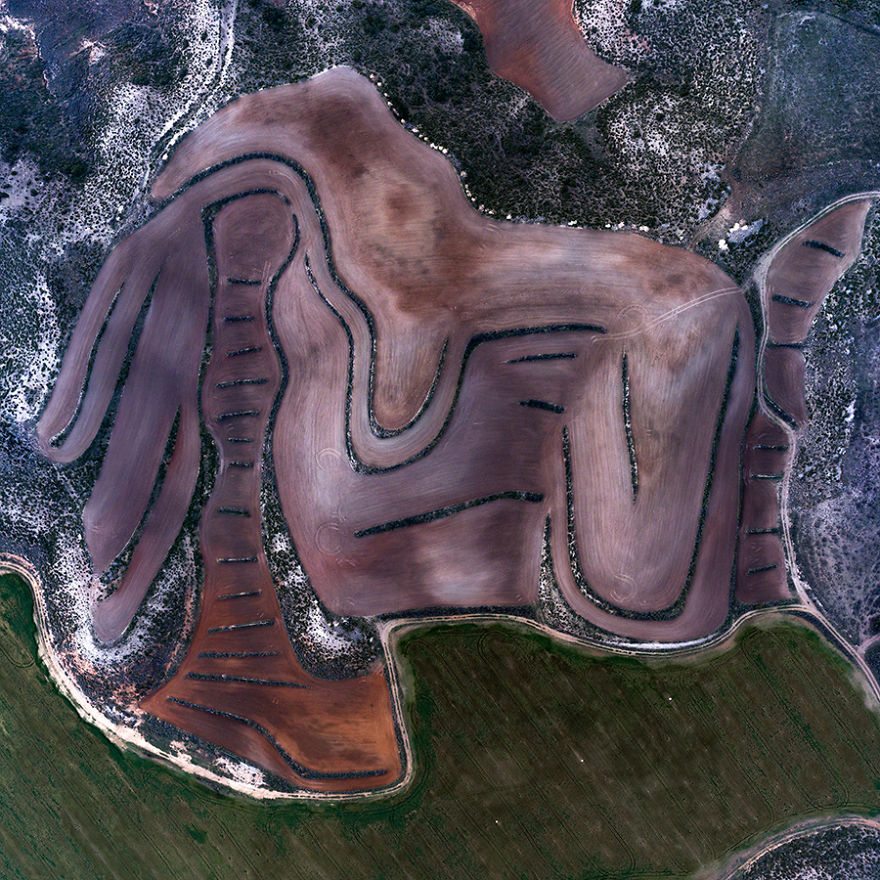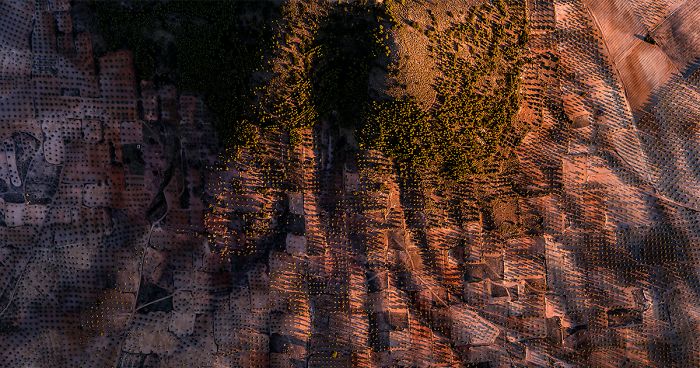
I Photographed Dry Spanish Farmlands That Resemble The Paintings Of Picasso, Miró, And Dalí
The series 'Sur/Real Lands' I made during the last couple of days of 2018 in the aridest regions of Spain.
I traversed the hill filled countryside near Zaragoza and Toledo, where, along the backs of the mountains, dried out streams had become farmland. Not only were these parcels easy to reach, but the soil’s moisture and fertility produced by the stream’s deposits helped farmers in the dry summer season. That is why in the picture we see there are exclusively two crops: olive plantations, which can bear the great heat, and wheat, which is harvested at the start of summer before the drought sets in.
Surely, the local farmers are not aware of what abstract formations their work has formed since they are only visible from the sky. After long hours of research and looking at satellite maps I was able to choose the most interesting sites. Later, on location, I photographed them in the best possible light.
The completed pieces are actually specially produced aerial photos that appear to be abstract paintings. They are landscapes with no horizon. The aerial perspective flattens the topography onto a plane, thus reinterpreting the landscape. Hills become patches and the slopes in between become lines, drawing map-like traces along the surface, which seems like a painter’s canvas. Time and space are suspended, and it is up to the beholder to decide what they are seeing – one-million-year-old geology, surrealism from the early twentieth century, mankind’s everyday struggle, or a prediction of future droughts.
The creative process takes these photographic compositions in the direction of turn-of-the-century Cubism, Surrealism, or Abstract Expressionism. Strong pareidolic forms in some of the pictures recall the work of Picasso, Miró, and Dali. Other works have no focal point like Vasarely’s art, reminiscent of patchwork. Or we see endless, frame-defying patterns in the vein of Simon Hantai, the famous inventor of the Pliage technique.
If this is truly how nature is, then could it be that we do not create art, we just already live in a realm of art that we have simply not noticed?
My works are awarded the Grand Prize at the 37th Hungarian Press Photo Competition and Award of Excellence at the 76th POYI (Pictures of the Year International) in USA are visual oscillations between the realistic documentation of a dried-out environment and the extravagance of painting.
The art pieces displayed at the Faur Gallery are actually composite pictures made up of multiple aerial photos. The largest ones contain as many as 100 megapixels. The unbelievably high resolution makes it possible to blow them up to human scale (1.5 meters or nearly 5 feet), so they may take their rightful place alongside paintings on gallery walls.
The 'Sur/Real Lands' series is one part of the Water.Shapes.Earth project. It is a chapter that uses aesthetic means to present and to document faithfully the scale of Humanity’s struggle when faced with a water shortage, as well as to demonstrate the water crisis that is now at Europe’s doorstep.
More info: water.shapes.earth | Instagram | Facebook
This post may include affiliate links.
Camino Del Molino
Amorphous forms of hatched wheat plots, freshly cultivated areas and irregularly shaped lands covered with uncultivated dry vegetation were shaped by late streams and reliefs.
Villamayor de Gállego, Zaragoza, Spain 12/29/2018
Size of territory: 1310 m
Valdemoracho
Spots of harvested wheat fields on the slopes of the hills where the moisture content of the soil helps the plantations survive the hot and dry summer season.
Parque Eólico Arias, El Burgo de Ebro, Zaragoza, Spain 07/14/2018
Size of territory: 928m
El Pozo
Camino del Pozo, La Guardia, Toledo, Spain 12/31/2018
Size of territory: 275 m
Valdecelada
Cultivated landscapes reveal diverse layers of soil that has been deposited thousands of years ago by rivers of the Ebro catchment area.
Peñalba, Huesca, Spain 12/29/2018
Size of territory: 738 m
Sierra Del Romeral
Tiny parcels filled with olive trees on the slopes of Mount Romeral, illuminated by the last rays of dusk and the last day of 2018.
El Romeral, Toledo, Spain 12/31/2018
Size of territory: 1584 m
Valdemoracho
El Burgo de Ebro, Spain
Size of territory: 695 m
Esquivias
Farmers use small parcels to level the sloping terrain in order to retain the rare rainfall. The Landscape is gray because of the high concentration of borax in the soil.
Esquivias, Toledo, Spain 12/31/2018
Size of territory: 793 m
Casar La Guardia
Tiny parcels are shaped by long-gone streams and volcanic relief, while the red color of the landscape is attributed to the high concentration of bauxite in the soil.
The Cedron river basin, La Guardia, Toledo, Spain 12/31/2018
Size of territory: 1130 m
Candasnos
Stacks of straw, piled on the top of a hill next to a wheat field at sunset in the blue hour.
Near Candasnos, Huesca, Spain 12/28/2018
Size of territory: 264 m
if you turn the photo upside down, it would kinda look like bannanas hanging from a tree.
Barranco De La Virgen
Wheatfields across the hills along with flat, sometimes wet areas where the moisture of the soil helps withstand the hot and dry summer season.
Barranco de la Virgen, Castillo de Alfajarín, Zaragoza, Spain 12/30/2018
Size of territory: 1400 m
Esquivias De Cerca
Esquivias, Spain
Size of territory: 416 m
El Presado Quadrado
Farmers create small parcels to level the sloping terrain for easy cultivation and sparse rainfall.
La Guardia, Toledo, Spain 12/31/2018
Size of territory: 920m
El Romeral Sur
The tiny, amorphous plots are shaped by long-gone streams and volcanic relief, while the elongated plots are formed on the site of a former river or flat lake bed.
El Romeral, Toledo, Spain 12/31/2018
Size of territory: 862 m
Arroyo De Guaten
From the aerial view former river beds only recognizable by their sinewy curves. In the dry area of central Spain, 30 kilometers southern from Madrid, we can see left behind water runs in form of cracks across the surface of once wetland, giving us an ominous look at what lays ahead as water retreats. Once River of Guate, today just small brook Arroyo de Guaten, provide water to the farmlands.
Esquivias, Spain, 12/31/2018
Size of territory: 710m
Sant Pere De Riudebitlles
Small vineyards planted around with olive trees illuminated by the first rays of the rising sun.
Sant Pere de Riudebitlles, Barcelona, Spain 12/28/2018
Size of territory: 865 m
Valdecarabanos
Patterns of alternating olive and wheat fields south of Madrid, in the catchment area of the Cedrone River, where these two crops can withstand extreme drought and high summer temperatures.
Huerta de Valdecarábanos, Toledo, Spain 12/31/2018
Size of territory: 1400 m
Barranco Del Tollo
Dry cracks and abstract patterns of wheat fields sweep across the hill filled area to reveal where the stream once flowed and where it deposited the foundations of the plants growing today.
Botorrita, Zaragoza, Spain 12/30/2018
Size of territory: 790 m
Valdemoracho
El Burgo de Ebro, Spain
Size of territory: 718 m
Small wonder that Spain has problems with decertification. This certainly looks like a landscape that has been under heavy agricultural use for thousands of years, not only for cultivating crops but also for herding animals by letting them roam freely. Moore wild trees are sorely needed.
Camino Del Molino De Cerca
Amorphous forms of freshly hatched wheat plots and irregularly shaped soils covered with uncultivated dry vegetation wind around rocky hills.
Villamayor de Gállego, Zaragoza, Spain 12/29/2018
Size of territory: 426 m
Valdecelada De Cerca
The cultivated landscape reveals different layers of soil during cultivation and mixes with the green color of freshly hatched wheat.
The catchment area of the Ebro, Peñalba, Huesca, Spain 12/29/2018
Size of territory: 406 m
Casar A La Guardia De Cerca
La Guardia, Toledo, Spain 12/31/2018
Size of territory: 408 m
Val De San Jorge
Trees on rocky hills form micro-islands in the newly cultivated agricultural area of Pina de Ebro near Bujaraloz.
Zaragoza, Spain 12/29/2018
Size of territory: 521 m
Vall De Mateo
Size of territory: 626 m
Botorrita
Stone walls around the former hills determine the form of Parcells where we encounter only wheat, which is harvested at the start of summer before the drought sets in.
Botorrita, Zaragoza, Spain 30/12/2018
Size of territory: 428 m
Val De Sonda
Small hills covered with dark, withered grass was surrounded with crop fields where fresh wheat was just hatched. The tiny lines are stone walls to keep soil and water on the lands.
Villamayor de Gállego. Zaragoza, Spain 30/12/2018
Size of territory: 680 m
Peñalba Brumoso
Cultivated landscapes reveal layers of the soil of different colors, deposited thousands of years ago by rivers in the Ebro catchment area, and reveal the amorphous features of the terrain, photographed in foggy conditions.
Peñalba, Huesca, Spain 12/29/2018
Size of territory: 803m
El Presado
La Guardia, Spain
Size of territory: 1060 m
Vall De Mateo
Size of territory: 835 m
Vall De Mateo
Size of territory: 947 m
La Muela
La Muela, Zaragoza, Spain 12/30/2018
Size of territory: 714 m
Val De Carro
Pina de Ebro, near Bujaraloz. Zaragoza, Spain 12/29/2018
Size of territory: 775 m
Curvas Del Caracol
La Muela, Zaragoza, Spain 12/30/2018
Size of territory: 702 m
Vall De Mateo
Along the dried-up river, different levels of cultivated soil reveal millennial sand-pebble deposits in different colors.
Fraga, Huesca, Spain 12/28/2018
Size of territory: 752 m
El Meridiano
Near Candasnos, Huesca, Spain 12/28/2018
Size of territory: 413 m
These are amazing photographs! They show how the landscape can be beautiful literally at many levels.
These are amazing photographs! They show how the landscape can be beautiful literally at many levels.

 Dark Mode
Dark Mode 

 No fees, cancel anytime
No fees, cancel anytime 


